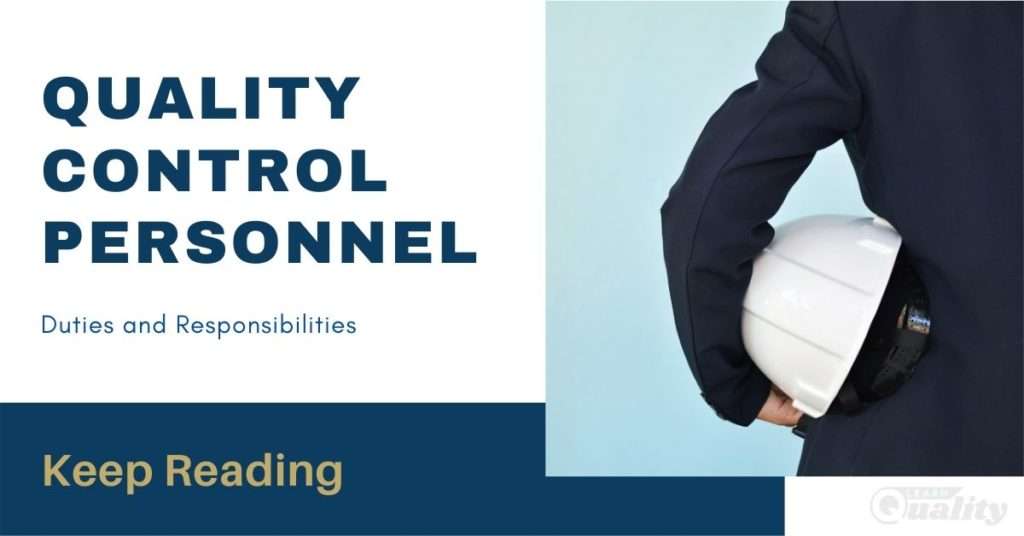Quality control is definitely an important part of businesses. Without a doubt, it’s the key to success for businesses. The business industry depends and strives on quality control. We can’t neglect the fact that it’s the most important concept they’ll ever need for establishing a successful business. And, here we have sorted all the quality control information that you’ll ever need. Here are the answers to what exactly is quality control, how it works, and what it brings for us, and other significant questions. So, without exaggerating let’s just dive into the pool of knowledge about quality control.
What is Quality Control?
Basically, it’s the system of maintaining standards in manufactured products by testing a sample of the output against the specification. Yet, you can define quality control in several other ways. Like, we can also define it as the process of setting standards and testing. This makes sure that you have done your product or service correctly.
It should be noted that a quality control system is a system by which you check goods at different points in the production process. But why? To ensure that there are no faults and defects. Moreover, whether the goods meet all necessary specifications or not. Furthermore, quality control also involves inspecting the finished products. This also helps in the confirmation of you are delivering what the customer wants in the best possible quality.
Companies, whether big or small often have quality control departments who work together to produce the best results. Some people even confuse this with the process of quality assurance, they may be identical. However, they are different.
Quality Control vs Quality Assurance:
Both of these methods play vital and distinct roles in the matter of companies. So, you just need to understand these roles to help your organization flourish. Moreover, mastering each helps in delivering the best products possible. Let’s not confuse both the terminologies, and start with what exactly is the difference.
Quality assurance (QA) looks at the wider aspect. It is basically a series of actions. This series of actions helps to design and manufacture a safe and effective product. They do this by building quality controls into the product life cycle. Quality Assurance is a part of quality management that focuses on providing confidence that we will fulfill the quality requirements.
On the other hand, quality control (QC) is the test procedure. This is used to verify that a product is safe and effective after you do the process of manufacturing. While, Quality control is a part of quality management that focuses on fulfilling the quality requirements like the faults in manufacturing, raw materials, etc.
Quality assurance points and relates to how you form the process is or how a product is made. Meanwhile, quality control focuses more on the inspection aspect of quality management. So, we can’t neglect both. Especially, when we know that they both are necessary. You can’t rely on QC or QA alone. You need both for efficacy.
QUALITY CONTROL
- Aims to identify and fix defects
- Method to verify the quality-Validation
- Involves executing a program
- Corrective technique
- Reactive measure
- Procedure to verify that deliverables
- Involves full software testing life cycle
- Confirms that everything follows standards while working on the product
- Performed only after QA activity is done
- High-Level Activity, and can identify an error that QA cannot
- More time-consuming activity
- Falls under validation activity
- Requires the involvement of the Testing team
QUALITY ASSURANCE
- Aims to prevent the defect
- Method to manage the quality- Verification
- Doesn’t involve executing the program
- Preventive technique
- Proactive measure
- Procedure to create the deliverables
- Involves full software development life cycle
- Defines standards and methodologies to meet the customer requirements
- Performed before Quality Control
- Low-Level Activity and can identify an error and mistakes which QC cannot
- Less time-consuming activity
- Falls under verification activity
- Requires the involvement of the whole team
Why is it important?
As we discussed earlier, that quality control plays an important role in businesses. But, why exactly it is important still remains a question. But, no worries! Here is the answer.
- It encourages and develops the quality consciousness among the workers in the factory.
- It satisfies the customer and earns a good reputation for the company.
- Effective inspection and control ultimately lead to a reduction in production costs.
- The process ensures the most effective utilization of available resources. Hence it reduces or maintains wastage.
- It leads to improve the employer-employee relationship. Along with it, it creates high morale for employees.
- The improved methods and the design of production ensures quality control.
- It facilitates price fixation and brings a significant increase in sales.

Process and Steps:
Here are the six basic steps that you need to implement the effective quality control process.
- The first step is to identify and set standards related to your work field.
- After that, you should decide which quality standards are more important. Along with it, identify what needs more attention and focus.
- Now it’s time to create the operational processes. This ensures high-quality products and services.
- Review the results you have achieved. Apart from it, see how well your company has progressed in meeting the quality standards.
- You can try creating surveys and getting valuable feedback from your customers.
- Once you get all the feedbacks, now work on the mistakes. Try to improve those areas to ensure the best results.

Popular Standards:
We all try to establish and maintain quality control standards. Hence, we must know what exactly they are. You can define that as the documents. This type of document highlights:
- Requirements
- Specifications
- Guidelines
- Characteristics
You can use these documents consistently to ensure that materials, products, processes, and services are fit for your organizational purpose.
Standards are important in businesses and are usually specified in the contractual documents, in the company manual, or by the end-user in the global economy, and even for consumers as well.
Principles of Quality Standard:
- Customer focus
- Leadership
- Engagement of People
- Process Approach
- Improvement
- Evidence-based decision making
- Relationship management
Quality Management;
ISO 9000
ISO 9001
Environmental Management
ISO 14000
ISO 14001
Safety Management
ISO 45001
Food Safety
ISO 22000
Quality Control in Oil and Gas Companies:
As we all know that the oil and gas industries face many challenges about quality control. As well as, there are heavy regulations on them. But, these five-step processes can make it easy for oil and gas companies.
- Create a Quality plan for your oil and gas company. Enlist all the quality standards, quality policies, requirements, and best practices.
- Now align the quality targets with the quality policies to minimize the risk.
- Work according to the quality assurance plan. Keep the quality control plans in mind.
- Develop the quality measurement techniques for improved quality.
- Don’t forget to work on quality improvement. You can do this with the help of previous mistakes and feedbacks. Definitely, it’s a continuous cycle.
Types of Quality Control:
Here are the 4 types of quality control tools:
- Process Control
- Acceptance Sampling
- Control Charts
- Inspection
The role:
Quality control is an important aspect of successful businesses. Quality control looks after the management process. This helps in making sure that you are delivering the best quality products. Therefore, if you practice quality control, it creates a positive impact on employee conduct. Moreover, quality control inspires the employees to create high-quality goods. Particularly, this thing leads to greater customer satisfaction. Furthermore, quality control protocols help you lower your inspection costs. Along with it, it tells you how to use the available resources cost-effectively.
The main objective?
It is not possible to achieve perfection in any business. But, what’s the main objective of quality control? It is to ensure that the business is achieving the standards that they have set for themselves. This always involves the process of setting standards. Especially, it also concerns that how much variation is acceptable in those standards for your organization. The aim is to ensure that product you manufacture is meeting the customer needs.
Is Quality Control a Good Job?
Yes! It surely is. As we know that every business and organization wants quality at its best. Hence, there are many scopes to this job. Quality controllers are in high demand by almost all manufacturers. So, there are many people now opting for this job as a career. Like, professional career. Undoubtedly, careers in these fields are essential for us as well. Because who wants a bike that falls over if you hit a speed bump or a knife that can’t cut. So, quality controllers are a need of this modern world to ensure premium quality products hit the market.
Who is responsible for quality control?
We have discussed enough how to control the quality and what measures to take. However, but we haven’t discussed who handles the quality control. If we put it simply, the short answer is everyone! Exactly, everyone is responsible for maintaining the quality. Every employee works in their own capacity to ensure that the best product comes as a result. However, a company often has a separate department for Quality Control/assurance activities. The department is known as the QA QC department, and the department’s employees, also known as quality control personnel, are specifically trained to handle the quality control tasks of a specific work at various stages following the company’s quality standard and procedure.
Methods of Quality Control:
Mainly, there are two methods of quality control, as discussed below:
1. Inspection:
It’s a common method used for quality control purposes. But, it has three more steps attached with it.
Product Inspection:
This helps in ensuring that the products companies deliver comply with the standards.
Process Inspection:
This ensures that the raw material, machines, and pieces of equipment are of good quality. Also, they should hit the prescribed mark. As well as, it saves wastage.
Inspection Analysis:
This helps the entrepreneur locate the points where the faults lie.
2. Statistical
This is an advanced method used to control the quality of a product. It uses statistical techniques to determine and control the quality. This process further creates three divisions.
- Analysis of Samples: The basis of this step is the sampling techniques. Firstly, we sample or identify the population. Then, you derive results from it. And, this leads to the statistical inspection of the whole manufactured lot.
- Use of Control Chart: This helps in depicting the results obtained from the analysis of samples in the form of a chart.
Corrective Measures: Now, the entrepreneur can easily locate the points of deviations and causes of them. And, this helps in taking corrective measures to improve the quality.

Quality Control Personnel:
Quality controllers of quality control personnel are extremely necessary for building a successful quality control department in an organization. There are designations that each and every person working for the QA QC department, some of the designations are listed below;
- QA Manager:
Quality Assurance managers play a crucial and important role in the success of a business. They work to ensure that the product or service meets the specified requirements and/or user expectations and criteria. Moreover, they handle the plan and coordination with QA teams. The plan and coordination help in formulating quality assurance/control practices in the company. And, they also strive to improve an organization’s profitability and efficiency.
- QC Manager:
Meanwhile, a quality control manager supervises staff and ensures all the tasks related to quality control are completed to a satisfactory level. Moreover, they also look for product development procedures. They make sure that the product’s quality and efficiency standards are up to the mark. Furthermore, they work with clients to ensure the final products meet their needs and requirements.
- QA QC Engineer:
QC engineers or QA engineers work closely with the department’s manager, develop or review quality procedures, coordinate with the quality control inspectors to ensure the specified requirements are met.
- Quality Controller or QC Inspector:
QC inspectors work in the production and distribution phase of a business, also known as Quality Control Inspectors or quality controllers. They make sure that products meet company standards and specifications. carry out inspection and testing either, visually, or with the help of instruments. They compare their finding with the specification and make inspection reports. These reports are then submitted to the immediate supervisor or manager for their review and approval before the product reaches the market and hits the shelves.
QA QC Inspector responsibilities and duties:
Are you looking forward to establishing a professional career in the quality control department? Then, here are the duties and responsibilities that you have to fulfill.
- Conduct Product Tests and Assessments of all the products. Including the one that is ready to be shipped. Along with it, they assess incoming raw materials.
- Take a thorough and deep look at the plans, specifications, and blueprints. This helps to understand the product and company’s requirements.
- You have the authority to reject all the incoming raw materials that fail to meet quality expectations.
- Record and Report the issues to the concerned department at the earliest.
- You have to support all the process improvements.
- Also, you have to resolve quality-related issues that adhere to deadlines and identify product defects.
- You have to create and prepare documentation of the inspection process. This also includes detailed reports and performance records.
- You have to ensure that the specification requirements are not deviated by the production team
- You have to guide the production team about the quality control issues to enhance the quality of the product.
- Coordinate with the client and manufacturer representative
- Issue NCR if a product does not meet the specification
- Prepare accurate and clear reports

QA QC Jobs:
As we established earlier, that there is a great scope of the quality controllers. Aside from the quality control certification stated in this article, you need some other things to improve yourself. A degree or diploma and some relevant experience in the work field make it ideal for getting a job in the quality control work field (discipline-wise).
Before garbing a job, that you can search online easily or offline from the job listing website. You should build a resume that contains all the necessary information, qualification, and experience you have. Once you make a resume, you will then be eligible to apply for the available jobs which could be either way. Also, to garb the jobs, you can consider an advertisement in a magazine or newspaper.
Don’t forget! An employer shortlists your resume first and asks your presence for a face-to-face interview after. Apart from face-to-face interviews, telephonic/skype, interviews have also gained popularity. If you clear these, the companies offer you your dream job in the industry as a quality controller or quality control inspector.

Quality Control Courses:
Courses for quality control? Yes, there are two types of quality control courses.
- General
- Specific
Also, you must do such courses to be proficient in your work. Although the job is basically a matter of experience, these things matter when it comes to building an impressive resume. Because a company won’t hire you if you don’t have the specific certifications in that course. Therefore, you must do these courses.
If we take the example of an oil and gas company, each and every work field in the oil and gas has its own quality control. Like,
- Civil work
- Mechanical work
- Thermal insulation work
- Piping work
- Fireproofing work
- Electrical and Instrumentation work
- Welding work
- Paint coating work
Additionally, the companies who deal for the above-listed work don’t hire personnel as quality controllers, unless he/she has the certification in the specific work discipline as quality control inspector. You don’t need to worry about where you can do these courses. Because there is a various educational institution that offers training and certification courses in these work disciplines.
It should be noted, that these courses increase your productivity and enable an individual to work as a quality controller. Here are some of the institutes that help you in this process of becoming a quality controller.
- American Petroleum Institute – API
- The Institute for Oil and Gas Sector – IOGS
- National Association for Corrosion Engineers – NACE
- The Welding Institute – TWI
- Institute of Corrosion – ICorr
- Academy for Industry – TIAI
- The Society for Protective Coating – SSPC
Most of the courses that we listed above are short. The institutes provide 2 days to 6 days of training. As well as, you may have the opportunity to learn online.
Here is a list of some general training programs that you can do to increase your knowledge regarding the field.
Inspection Checklist:
Last but not the least, this is the last significant thing that you need to know. Inspection Checklist!
What is the inspection checklist?
Inspection Checklist is basically a written guide. A written guide that covers all your products’ contents. Starting from the packaging, color, barcodes, appearance, possible defects, functions, and ending at special requirements, a checklist covers all. Also, you can term it as the “inspection criteria sheet” or inspection checklist. This checklist can vary with the companies. Obviously, similar companies have similar contents, hence the checklist is similar. But, it varies with every organization. You can’t use the quality control checklist of a gas company in a furniture company.
But, what remains the same is the importance of a checklist. So, you should maintain a checklist to keep a track of your work and ensure the best results. Here are the essentials of a checklist.
- Product requirements
- Packaging requirements
- On-site tests and checks
- Defect classification
- Collaboration between the importer, supplier, and QC staff


